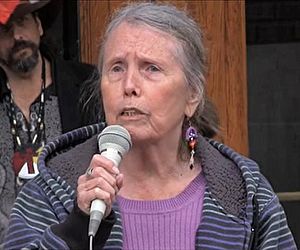Ramona Bennett facts for kids
Quick facts for kids
Ramona Bennett
|
|
|---|---|

Bennett speaks at a Rally for Leonard Peltier & Mother Earth in 2013
|
|
| Born | August 28, 1938 |
| Nationality | Puyallup; American |
| Alma mater | Evergreen State College University of Puget Sound |
| Known for | Native American activism |
Ramona Bennett (born August 23, 1938) is an American leader and activist from the Puyallup people. She was a key figure in the 1960s and 1970s Fish Wars in the US Pacific Northwest. She also worked hard to protect tribal sovereignty, which means the right of Native American tribes to govern themselves.
Contents
Early Life and Learning
Ramona Bennett was born in Seattle, Washington. She also has family ties to the Swinomish and Yakima tribes through her mother. Her parents were Archie and Gertrude Church. Soon after she was born, her family moved to Bremerton, Washington. Her father worked there in naval shipyards.
Ramona's mother made sure she learned about and was proud of her Indigenous heritage. Ramona went on to earn a bachelor's degree from Evergreen State College. Later, she earned a master's degree in education from the University of Puget Sound in Tacoma.
Fighting for Rights: Activism
In the early 1960s, Ramona Bennett worked at the Seattle Indian Center. She became involved in many community programs, including the American Indian Women's Service League. She became even more active by working with other leaders like Bernie Whitebear. He was part of the effort to claim the Fort Lawton site, which later became the Daybreak Star Cultural Center.
Joining the Tribal Council
Ramona wanted to help improve housing, education, and health care on the Puyallup reservation. Because of this, she was elected to the tribal council in 1968.
When the Puyallup people decided to fish from the Puyallup River, they faced strong opposition. This came from commercial fishers, environmental groups, and local police. The banning of fish traps went against the Treaty of Point Elliott (1855). This treaty had promised Native people continued access to natural resources, like fish, in their traditional fishing spots.
Standing Up for Fishing Rights
In 1964, Bennett helped start the Survival of American Indians Association with Janet McCloud. She often worked with Hank Adams and other activists. They developed plans to protect fishing rights and other Native American treaty rights. Ramona and Hank even helped fishermen find safety in a local Puyallup Episcopal church.
Her work was similar to other Indigenous fishing rights activists in the Pacific Northwest, like Billy Frank Jr.. Ramona also learned from other movements, such as the Civil Rights and Red Power Movement. She visited the Alcatraz occupation with Bernie Whitebear and Hank Adams. There, she saw how activists were reclaiming land and demanding recognition of Indigenous rights.
Ramona often sold salmon caught by her tribe at Black Panther Party events. This helped support the Survival of American Indians Association. Many famous people, including Marlon Brando, Dick Gregory, Buffy Sainte-Marie, and Jane Fonda, supported Indigenous causes in the Pacific Northwest. Jane Fonda was even arrested at Fort Lawton.
Protecting the Camp
In 1970, Ramona Bennett and other Puyallup people set up a camp. They called it "the ceremonial place" and protected it, even with firearms. State and federal police attacked the camp. Nearly 60 campers, fishers, and protectors were arrested and treated roughly. Ramona Bennett was hit by a gas canister during this event.
Leading the Tribe
Ramona was elected tribal chairwoman in 1976. She recalled that when she went to a meeting of the National Tribal Chairman's Association, she was initially not allowed in because she was a woman. She insisted on her right to be there and not be sent to sit with "the chairman's wives."
She immediately began to argue for the protection of Native American children. She was especially concerned about children adopted outside of their communities. Her ideas were included in new laws. This led to the passage of the 1978 Indian Child Welfare Act. This law helps keep Native American children connected to their families and tribes.
Bennett also helped organize a week-long occupation of the Cushman Hospital in 1976. This hospital was on land that had been taken from the Puyallup people.
Important Legal Decisions
In 1974, a major court decision called the Boldt decision ruled that Native Americans in Washington had treaty rights to half of the fish caught. This was a big win for tribal fishing rights.
After her time as Tribal Chairperson, Ramona Bennett continued to work for her community. She worked at the Wa-He-Lut Indian School in Olympia. In 1989, she worked with the Rainbow Youth and Family Services. She has said that "virtually everything constructive I've done has been because children might need it."
In 2003, Ramona Bennett received an award from the Native Action Network. That same year, she was also given the Enduring Spirit recognition by the American Native Women's Leadership Development Forum.
 | Dorothy Vaughan |
 | Charles Henry Turner |
 | Hildrus Poindexter |
 | Henry Cecil McBay |

